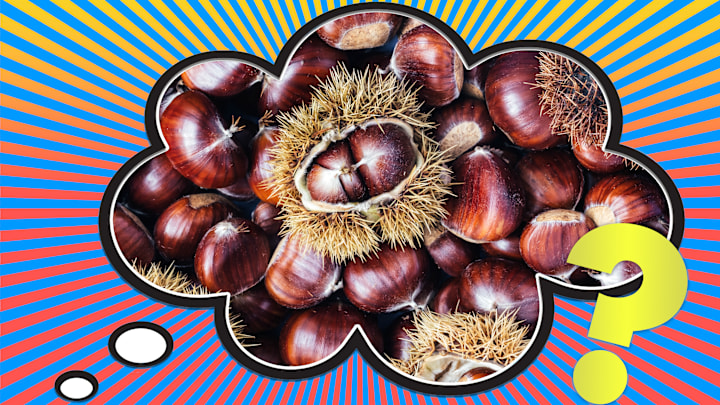Have you ever heard someone tell a tired old joke, only for someone else to dismiss it as an “old chestnut”?
Jokes aren’t the only thing to get labeled this way. Everything from well-trodden movie tropes to overplayed songs, old anecdotes, and trite clichés and stereotypes might be called a “chestnut”—anything, as the Merriam–Webster Dictionary puts it, that is “repeated to the point of staleness.” But where does this bizarre expression come from?
Chestnuts themselves aren’t to blame: Etymologically, they take their name via French and Latin from the Greek word for a chestnut or chestnut tree, kastaneia. There’s some debate over where that word comes from. The Oxford English Dictionary suggests that chestnuts were named after a town called Kastanea in Thessaly, while other sources suggest it’s more likely the town was named after the trees that grew there, not the other way around. If that second theory is true, then the word is probably far older than we think—it might have roots in some even more ancient language of southeast Europe or Asia Minor.
The connection between chestnuts and old stories is far more recent, and though there are a few theories about its origin, experts believe the most probable is that this sense of chestnut first emerged in theatrical circles in the United States in the mid-19th century.
In 1816, an English theatrical manager and playwright named William Dimond staged a production of one of his works, called The Broken Sword, at London’s prestigious Covent Garden Theatre (now the Royal Opera House). The opening act of the play contained this exchange between two characters—Zavior, a brash naval captain, and his long-suffering companion Pablo:
ZAVIOR: Let me see—ay! it is exactly six years since … I mounted a mule at Barcelona, and trotted away for my native mountains. At the dawn of the fourth day’s journey, I entered the wood of Collares, when, suddenly, from the thick boughs of a cork-tree—
PABLO: A chestnut, captain, a chestnut! … Captain, this is the twenty-seventh time I have heard you relate this story, and you invariably said a chestnut, till now.
Although the play wasn’t too popular with critics, it still proved enough of a success with audiences to warrant a move to the United States. And so long as theatrical folklore is to be believed, it was the cast of one of the American productions that apparently gave us our old chestnut.
In an article in the in the mid-1880s, a theatrical manager named Martin W. Hanley recounted that he had been touring a production of The Broken Sword when one of the actors began telling a funny anecdote backstage. “Everybody interrupted with shouts of ‘Chestnut!’ ” Hanley explained. “It clung to the company all the season and, of course, was soon caught by the profession.”
Admittedly, there are a couple of rival versions of this tale, each mentioning a different actor in a different city, and a different touring performance of Broken Sword. There are also competing theories about chestnut being a corruption of the words just not; the family name Chestnut; or stories involved patrons of a theater on Chestnut Street in Philadelphia. But it seems that Dimond’s play is the most likely origin of our old chestnut—unless all of these stories turn out to be nothing more than old chestnuts themselves.
Discover More Phrase Origins:
